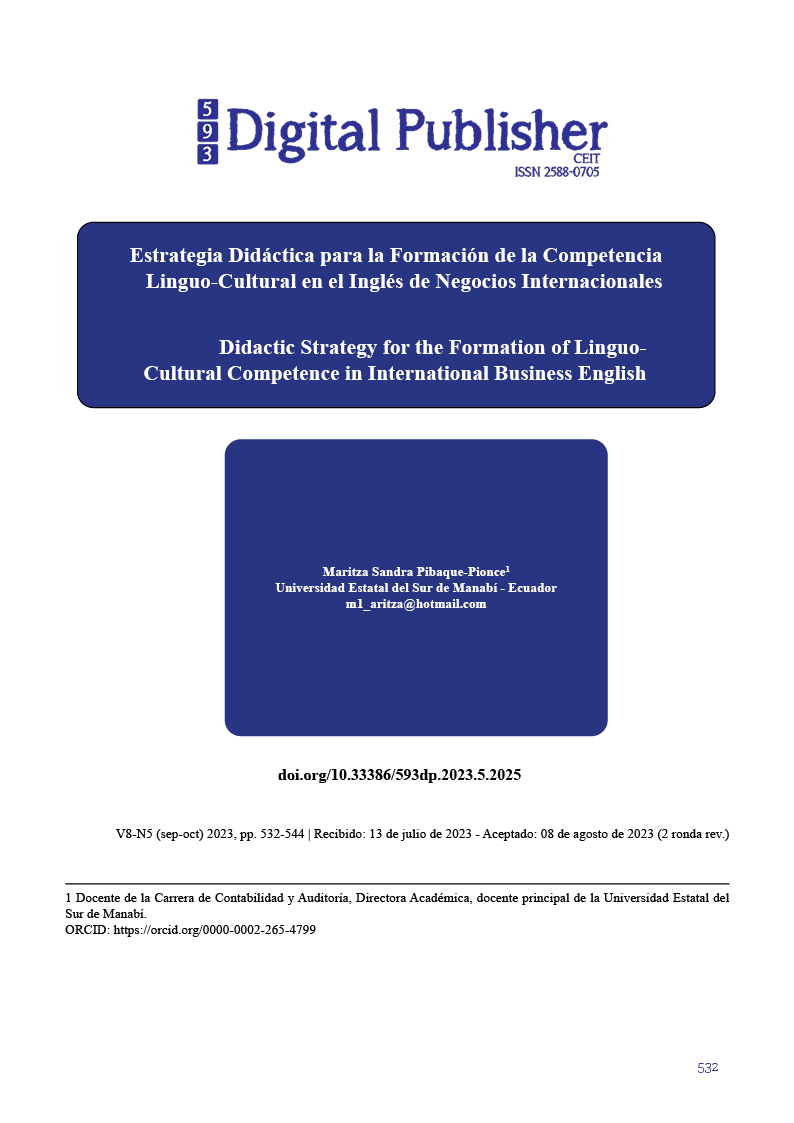Inglés de Negocios Internacionales Didactic Strategy for the Formation of Linguo-Cultural Competence in International Business English
Main Article Content
Abstract
This research work ventures into the teaching-learning of English for specific purposes, with a focus on language teaching in which all decisions, both content and method, are based on the reasons and needs of the student, alluding to the international business careers, today recognized as business English. What currently makes it possible to determine the effectiveness of a didactic strategy, based on a model of the formation of linguo-cultural competence, from the teaching-learning of English. The significance of this research lies in the fact that the conversion of English into a lingua franca has raised the urgent demand to learn to communicate in English, to carry out procedures, transactions at a national and international level, which allows implementing strategies that lead to the internationalization of the organizations. To achieve the quality of this work, exploration methods and techniques are emphasized, the same ones that were applied through interviews, surveys, direct observations, the analysis of the products of the composition activity, notebooks, evaluation scales, the method expert and pre-experimental. As the main conclusion derived from a detailed analysis, the functionality of the strategy as an instrument that favors the formation of the competences-object of analysis that has been considered together with the students at the State University of the South of Manabí. In the same way, perspective lines of the investigative work are derived to give it continuity, in the field of English and its application to the emerging discipline that deals with international business.
Downloads
Article Details

This work is licensed under a Creative Commons Attribution-NonCommercial-ShareAlike 4.0 International License.
1. Derechos de autor
Las obras que se publican en 593 Digital Publisher CEIT están sujetas a los siguientes términos:
1.1. 593 Digital Publisher CEIT, conserva los derechos patrimoniales (copyright) de las obras publicadas, favorece y permite la reutilización de las mismas bajo la licencia Licencia Creative Commons 4.0 de Reconocimiento-NoComercial-CompartirIgual 4.0, por lo cual se pueden copiar, usar, difundir, transmitir y exponer públicamente, siempre que:
1.1.a. Se cite la autoría y fuente original de su publicación (revista, editorial, URL).
1.1.b. No se usen para fines comerciales u onerosos.
1.1.c. Se mencione la existencia y especificaciones de esta licencia de uso.
References
Addine, F. R. (2017). Didáctica y práctica. (2da.ed.). Ciudad de La Habana: Ed. Pueblo y Educación.
Bezencon, N. y. (2017). Tendencias de investigación en el sector de los servicios. 45.
Colunga, S. y., & Dusú, R. (2019). Fundamentos psicológicos
Diagama, M. (2017). Fundamentos desde la perspectiva de los negocios.
literatura*, L. n. (s.f.).
Domingo, J. (2011). La competencia sociocultural como potenciadora de las habilidades comunicativas en contexto de inmersión. Trabajo académico de 4º curso. Universitat Pompeu Fabra. Facultad de Traducción e Interpretación.
Elorza, I. (2019). http://gredos.usual.es. Obtenido de La lengua de especialización: concepto y análisis. En aspectos de la didáctica del Inglés para Fines Específicos. La traducción especializada como método de evaluación formativa y de autoevaluación.
Garayeva, D.F.. (2014). The development of linguo-cultural competence of students in teaching the history of the English language. En Procedia - Social and Behavioral Sciences 152 (2014). 1012 –
1018. ERPA 2014. http://creativecommons.org /licenses/by-nc-nd/3.0/
Harris, M.(2001). Antropología cultural. Tercera reimpresión. Antropología. Alianza Editorial. En http://www.bsolot.info/wp-content/uploads/2011702/Harris. Marvin-antropologia-cultural.pdf.
Hernández, P. N., & Jaramillo, Y. A. (2019). Los negocios internacionales y el relacionamiento económico: una revisión de la literatura* (Vols. vol. XXVII Horruitiner, P. (2011). Fundamentos pedagógicos.
Horruitiner, P. (2011). La educación superior: retos y perspectivas en la sociedad cubana. Educación Cubana. En http://scholar.google.com.ec/scholar?q=horruitiner+p+2011&btnG=es&¡as -sdt=0%2C5
Hutchinson, T. &. (1992). En T. &. Hutchinson, English for Specific Purposes. A Learning - Centered Approach. New York. Cambridge University Press.
Labarrere Reyes, V. G. (1988).Pedagogía. Pueblo y educación. La Habana
Elorza, I. (2019). http://gredos.usual.es. Obtenido de La lengua de especialización: concepto y análisis. En aspectos de la didáctica del Inglés para Fines Específicos. La traducción especializada como método de evaluación formativa y de autoevaluación.
Pérez, F. J. Martínez, N. y González, G.E. (10 de diciembre de 2019). Competencias interculturales. pág. 17.
Rha, Lee. (2018). Tendencias de investigación en el sector de los servicios.
Rodriguez Durruthy Yaima, H. A., & Rodriguez Durruthy, Y. (2021). https://dialnet.unirioja.es/servlet/articulo?codigo=8976255.
Ruiz, M. (29 de 05 de 2018). Aplicaciones pedagógicas del informe empresarialen el aula del inglés de los negocios. Obtenido de https://www.tdx.cat/handle/10803/10434;jsessionid=D4DE2F2866606667BD3877FFBABE43F8#page=1: https://www.tdx.cat/handle/10803/10434;jsessionid=D4DE2F2866606667BD3877FFBABE43F8#page=1
Tobón, S.,. (2009a; 2009b; 2010; 2011a; 2011b, 2012a). Competencia comunicativa en inglés como lenguaNurzhanova A., B. S. (2018). Teoría de metodología de enseñanza de lenguas. 32.
Van Essen, A. (2018). The rise and role of English as an international language some educational consequences. Obtenido de http://www.hltmag.co.uk/nov04/mart02htm.


